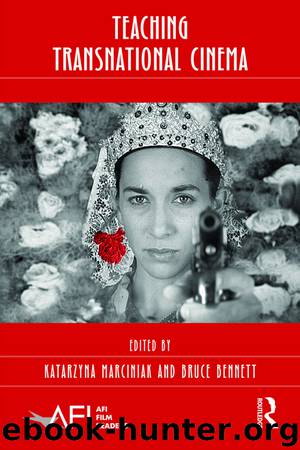Teaching Transnational Cinema by Unknown

Author:Unknown
Language: eng
Format: epub
Publisher: Taylor & Francis (CAM)
the larger pedagogical picture
In what follows, I begin by situating the performative model of transnational film pedagogy in the context of larger debates about pedagogy, more specifically, those related to John Dewey’s pragmatist philosophy27 and Howard Gardner’s concept of multiple intelligences. I subsequently consider the different elements in the model, as it was developed in the Lingnan course, and the ways in which they worked together to create the conditions for the desired types of student agency. The elements in the model represent a genuine mix of interconnected activities that together provide a “scaffold” supporting the attainment of clear learning outcomes specific to a performative model of transnational film pedagogy.28 Outcomes that are constitutive of the model include the analytic ability to sort transnationalisms according to type and along axiological lines; the practical ability to design and mount a transnational project; and the disposition to engage in activities contributing to affinitive and milieu-building transnationalisms.
Whereas aspiring university teachers were once left to develop pedagogical skills more or less on their own—by observing their teachers and by trial and error—explicit accounts of pedagogical approaches and techniques now figure centrally in any number of university discourses, including those pertaining to governments’ expectations of publicly funded tertiary sectors. A case in point is Hong Kong’s University Grants Committee having mandated, almost a decade ago, that the eight government-funded universities were to adopt an outcomes-based approach to teaching and learning, with learning outcomes being clearly articulated and explicitly tied to assessment modes. While no doubt a positive development in many respects, the intense interest in teaching and learning that exists today is also an outgrowth of phenomena that are either unambiguously problematic or potentially so: soaring student debt and parents’ and students’ legitimate concerns about the issue of value for money; the growth of the “for-profit” sector; the tendency for universities to embrace corporate models of governance (and the commercial mind-set underwriting the private sector); and institutions’ mobilization of Net-based pedagogies for the purposes of brand building and/or profit.
Pedagogy, as a discipline, generates as diverse a body of views and knowledge as any. An important task for anyone interested in developing a performative model of transnational film pedagogy is to indicate where the model might be situated in that larger disciplinary landscape. The claim here is that there is considerable support to be found in the efforts of researchers and teachers who are devoting energy to experiential learning and student agency (often in relation to philosophical principles that can be traced to John Dewey),29 to the implications of Howard Gardner’s ground-breaking work on multiple intelligences,30 and to the continued relevance of liberal arts education in a contemporary environment that favors the STEM (science, technology, engineering, and math) fields and professional skill-sets that make graduates employable. There is much to be said about the value of embedding the proposed performative model of transnational film pedagogy in a liberal arts context. Suffice it to say that the commitment in liberal arts environments to whole-person education and transferable
Download
This site does not store any files on its server. We only index and link to content provided by other sites. Please contact the content providers to delete copyright contents if any and email us, we'll remove relevant links or contents immediately.
Call Me by Your Name by André Aciman(20478)
Ready Player One by Cline Ernest(14625)
How to Be a Bawse: A Guide to Conquering Life by Lilly Singh(7464)
Wiseguy by Nicholas Pileggi(5757)
The Kite Runner by Khaled Hosseini(5159)
On Writing A Memoir of the Craft by Stephen King(4924)
Audition by Ryu Murakami(4917)
The Crown by Robert Lacey(4795)
Call me by your name by Andre Aciman(4671)
Gerald's Game by Stephen King(4631)
Harry Potter and the Cursed Child: The Journey by Harry Potter Theatrical Productions(4487)
Dialogue by Robert McKee(4379)
The Perils of Being Moderately Famous by Soha Ali Khan(4204)
Dynamic Alignment Through Imagery by Eric Franklin(4201)
Apollo 8 by Jeffrey Kluger(3699)
The Inner Game of Tennis by W. Timothy Gallwey(3664)
Seriously... I'm Kidding by Ellen DeGeneres(3622)
How to be Champion: My Autobiography by Sarah Millican(3578)
Darker by E L James(3507)
